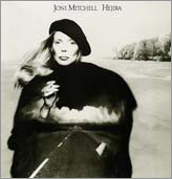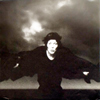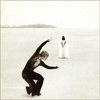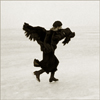An emblematic society, with its housewives languishing in front of their television sets "with no colours and no contrast", abandoned every morning by their commuting husbands who rush to their Downtown offices in cars purchased on credit and blocked in the traffic on congested asphalt highways, or sleeping aboard air-conditioned suburban trains (a premonition for the Mad Men from the TV series of the 2010s, outlined by Mitchell’s insight about forty years before the TV Show’s heydays…)
From a musical standpoint, The Hissing of Summer Lawns is a beauty. A manifesto that concentrates all of Joni Mitchell’s experimentations and the liberty to act and to think, and consequently establishes the musician's "trademark". Rock and sexual freedom with In France They Kiss on Main Street. Unashamed buoyant Jazz with Harry's House - Centerpiece, disconcerting "World Music" with the Burundi drummers in The Jungle Line, sumptuous symphonic textures with Shades of Scarlett Conquering. Deep Gospel in Shadows & Light. The alchemy that binds these ingredients together being the lady's exponential talent, which explodes on every word and every note of music. Automatically watered lawns flooded by the rays of a dazzling summer sun, as bright as Mitchell's vision. In retrospect, the virulent rejection of this album by critics and "fans" of Mitchell's first incarnations, causes nothing but embarrassment and disbelief today.
To be convinced of that, one only needs to remember a few selected excerpts from reviews which totally missed the point... to the difference of Prince (and others, like Kate Bush or Björk) : The "Minneapolis Kid" publicly hailed the merits of the album by declaring Hissing to be one of his favorites of all times.

"The Hissing" Photo
Session" /
© Norman Seeff
Source: Pinterest
ohm ck / Artists
So, a few bashing samples out of a long list : The New York Times (1975) / Triton Times – UC San Diego (1976) / Creem Magazine (1976) / Rolling Stone 1975) /... Fortunately, some exceptions exist, highlighting the capacity of certain professional critics (or amateurs) to detect the spark of genius in some work : Dallas Morning News (1975) / Philadelphia Gay News (1976) / The Observer (1975).
But things do not stop there. Already disconcerted by the output of Hissing, critics with rare exceptions would also misunderstand its successor, the album Hejira (Rolling Stone Magazine - 1977), an acoustic "Road Movie of the Heart" which they did not know how to handle... Perhaps the disappearance of the early albums' "engaging melodies" was responsible for this lack of enthusiasm… Again, some will prove to be more positive and far-sighted in their comments > Tangerine, Utica College, 1977 / Rolling Stone Magazine, 1976.
However, the seemingly austere, hypnotic, icy (at first listenings only), and haunting Hejira is yet undoubtedly THE absolute masterpiece of Joni Mitchell.
A work of a richness and density never reached elsewhere by any other musician and songwriter, that envelops the listener after only a few plays, giving birth then to pure hypnosis. Hejira’s very specific rhythmic sound and Jaco Pastorius’ bass -both weaving its generic tone-, are certainly for something in this addictive fascination. Black Crow -stabbing, jerky and ragged-, and Blue Motel Room -a soothing, melodious, lascivious and halftone "Blues"-, are the only musical bifurcations to be found in the fluid and contemplative pace that drives Hejira's frozen highways.
© Jacques Benoit. Design, works, photographies and texts by Jacques Benoit and under the author’s copyright. Except when derived from other sources and then mentioned as such.



